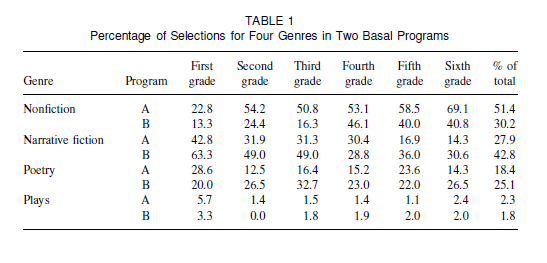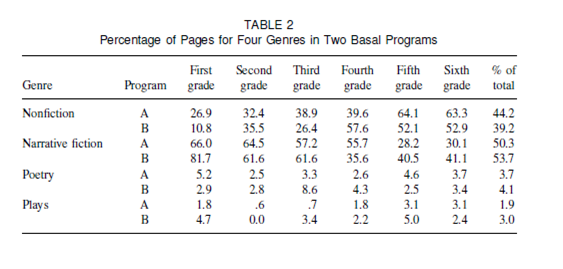There are few plausible contributors to this trend. First, there's a likely underestimation of the importance of background knowledge to reading. If you think of reading as a pure skill that can be applied equally well to any content, then the content with which one trains is irrelevant. Second, some seem to be believe that students need to read about things that are familiar to them, as illustrated by this opinion piece in Education Week, an opinion that is hard to square with the enthusiasm kids show in learning about ancient Egypt, dinosaurs, the natural world around them, etc. Third, basal readers may emphasize fiction because it is easier to create fiction that is non-controversial, and likely to anger no one on a school board or the PTA. Diane Ravitch’s book, The Language Police, documented the extent to which education publishers are frightened by controversy.
A new study (Moss, EDIT--I mistakenly said this was a 2012 study--it was published in 2008) of basal readers used in California indicates that things might be getting a little better on this front, but we are still not where we ought to be. Barbara Moss analyzed the two most recently adopted basal programs in California to determine the percentage of selections in grades one through six that are devoted to different types of prose.
Here are the results
The author compares the observed percentage to that recommended by the NAEP: about 50% in fourth grade, increasing to 55% in eighth grade and 70% in twelfth grade. I’m not crazy about setting our standards by the demands of a standardized test, even one as good as the NAEP. That’s the tail wagging the dog. Rather, we should construct our tests to reflect our educational goals.
In the case of reading, most adults read texts that are mostly informational. To enable comprehension, schooling should provide a wide foundation in the sort of knowledge that these texts demand. That knowledge need not come exclusively from reading—indeed, in early grades, it cannot. But given that most instructional time in early grades goes to reading, it’s important that the reading content support the goal of building background knowledge.
Moss, B. (2008). The information text gap: The mismatch between non-narrative text types in basal readers and 2009 NAEP recommended guidelines. Journal of Literacy Research, 40, 201-219.
Moss, B., & Newton, E. (2002). An examination of the informational text genre in basal readers. Reading Psychology, 23, 1–13.
Venezky, R. L. (2000). The origins of the present-day chasm between adult literacy needs and school literacy instruction. Scientific Studies of Reading, 4, 19–39.


 RSS Feed
RSS Feed